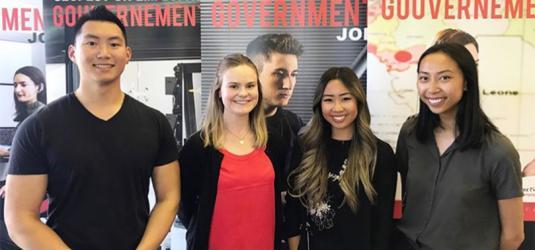
Having studied abroad, participated in unpaid internships in two different countries, and done my fair share of traveling over the past four years, I decided it was time to get serious about my career. Like many millennials, I was sure about what I did not want to do, and only possessed a vague idea about what truly interested me. I applied to Health Canada on a whim, partly because my academic interests lie in global health, and I hoped to come across opportunities to connect with individuals who work in the field of global health. I knew a government job would be a valuable co-op experience, both in terms of doing rewarding work as a public servant and in providing networking opportunities to students therein.
Pre-Departure
I applied to a Junior Policy Analyst position advertised to support the Health Products and Food Branch’s activities. As an International Studies Major, I had relatively little knowledge about Health Canada before applying, however, as I had prior research and policy experience, I took a chance on the opportunity. A few weeks after I had submitted my application, I received a telephone interview invite. Prior to being interviewed, I did some research on the Branch, the Directorate, and the Division to familiarize myself with the devolution of Health Canada – information that can be accessed through each department’s website. Shortly after my telephone interview, I was notified that I had been offered the position, which I gratefully accepted.
However, there was an unanticipated delay processing my paperwork, so my work term was then pushed to the following semester. While it was frustrating to endure the delays, I remained in touch with my supervisor. The team understood my situation, as these types of setbacks can happen, and they continued to support me during the weeks of uncertainty, keeping me posted on the status of my paperwork. After all, how one reacts to an unexpected situation often speaks volumes about their character.
Life at Health Canada
When I finally arrived in Ottawa, I began to learn the ropes of my work. Within the Health Products and Food Branch (HPFB), which is mandated to manage health-related risks and benefits in Canadian health products and food, I was part of the Workplace Policy Unit within the Resource Management and Operations Directorate. My work focused on three overarching themes: mental health, talent management, and employee well-being, all of which constitute the Branch’s ‘People Agenda’, which aims to foster an engaged, innovative, and future-oriented workplace through training and development, employee well-being initiatives, and human resources planning.
Contrary to popular opinion, public servants are extremely busy people! While I was wading my way through pages of onboarding materials – mostly familiarizing myself with the acronyms -- my team was working on multiple projects, all related to the three aforementioned themes. As I became tasked with more responsibilities, I began to realize the value of having contacts in other units, divisions, and directorates. As my unit tended to focus on branch-wide initiatives, I was fortunate enough to work on high-visibility profiles and connect with more senior employees from other areas of HPFB through executive committee meetings which enabled me to piece together the connections between the various projects on which I had been working in collaboration with my team.
Building Relationships in the Federal Government
I realized early on that the more connections one makes in the government, the more opportunities present themselves. The federal government is an arena in which employees are encouraged to continuously develop professionally. Creating a wide-reaching professional network opens many doors for students and new graduates alike, simply by establishing relationships with others. Listed below are five tips for effective relationship-building in the federal government to jumpstart your career.
1. Meet at least one new person every week
This tip was given to me by HPFB’s Assistant Deputy Minister and is extremely important for students to expand their networks during their work term, starting from day one. While your first month will be filled with meeting new people, the following weeks can help to set you up for success in creating a diverse professional network.
2. Take initiative
You are responsible for your own career development. By taking responsibility, you will be able to better steer your career in the direction that is of most interest to you. For example, joining the Young Professionals Network, specific to your department, enables you to connect with other students or new graduates in a friendly, relaxed environment.
3. Enlist your manager’s help
Your manager is a valuable resource. A good manager will support your professional development through connecting you with individuals in areas that pique your interest, possibly even outside your area of expertise. Career development is a priority for Health Canada and the opportunities for professional advancement are plentiful if you simply ask.
4. Follow up with people you meet
Ensure to exchange contact information with a new connection and send them a thank-you email afterwards. People notice the personal touches, so relate it to something that you talked about. If you can, connect on LinkedIn and send them a personalized invitation to connect!
5. Be professional
Remember, you are acting as an ambassador for SFU within the federal government. Managers will notice your behavior in the office and conducting oneself with professionalism will open doors for professional references and potentially another co-op work term or a job after graduation.
Conclusion
In all, working in Health Canada, and within the field of public service more broadly, is a fantastic co-op experience. However, it is entirely what you make of it: if you do not make the effort to develop professionally, your experience will not be as beneficial as it could be. I have made some great connections in offices, both in Health Canada as well as the Public Health Agency of Canada, that are of significance to me, and I hope to continue to cultivate these relationships for the years to come as I look forward to my next steps after graduation.
Beyond the Blog
-
For more opportunities like Kate's, visit the FASS co-op page!














